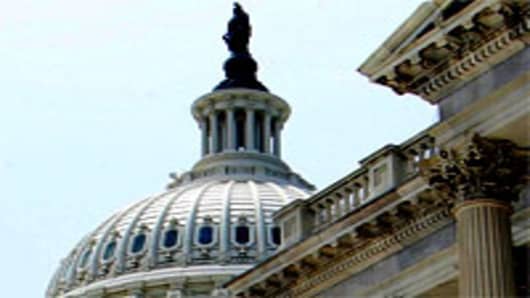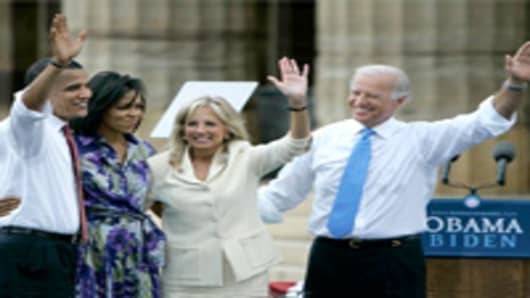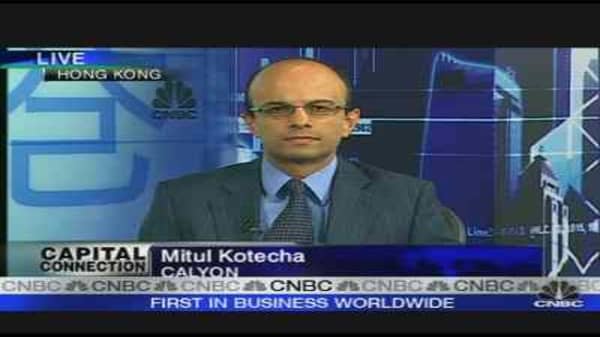Though it's too soon to say whether Christmas will arrive early in the nation's capital, Barack Obama's victory and an expanded majority in Congress could encourage Democrats to make up a list of economic stimulus measures and check it twice.
House Speaker Nancy Pelosi on Wednesday urged passage of at least $61 billion in new economic stimulus funding this month, but said the future of the legislation requires the cooperation of Republicans in the Senate and President Bush.
House Majority Leader Steny Hoyer told CNBC earlier in the day that "we need to act sooner than later" on a second stimulus package but didn't commit it to it getting it done in a lame duck Congressional session, which would presumably start in mid- to late-November. (See video here)
Government spending analysts say the election results now make it more likely a second fiscal stimulus package will be approved in a lame-duck session and that the cost will be closer to the high end of estimates.
"Yes, I think so, because everyone seems to be looking for help," says Tom Schatz, president of Citizens Against Government Waste, adding, "People are asking: 'Where's my bailout.'"
Hoyer used a $100 billion figure, but didn't describe what kind of support it had.
For Investors
- Why There Is No Post-Election Rally
- The "Next Four Years" Trade
- Markets the Day After an Election
- The Market and Obama: Chandler
- Obama Win=Oil Up, Dollar Down
- First Move Should Be Save Autos: Ross
When Congress started talking about a successor to the original $168-billion stimulus package a couple months ago, the price tag was about $60 billion. It wasn’t long before it was $150 billion. Then $300 billion was thrown around.
"I think it may be on the medium side," says Robert Bixby, executive director of the Concord Coalition, which advocates fiscal responsibility. "I don't like to think of $200 billion as small, but that number is realistic," partly because it is around the size ($190 billion) Sen. Obama was advocating before becoming President Elect, he said.
Obama, for one, didn't tip his hand in his victory speech. He emphasized broad themes, such as shared sacrifice and prosperity, and didn't make much of the mandate concept.
Regardless, critics and supporters alike, should hope that the next fiscal stimulus package is more of a commercial success than its predecessor, lest another big-budget flop be tacked on to the ever-growing federal debt.
The hastily conceived first stimulus package quickly signed into law last February was built around tax breaks for business and tax rebates for consumers, whose impact on the economy was fleeting, at best.
This time around—with recession a reality not a perceptionand consumer confidence at a record low—Congress is likely to want more measures along with more money. But that doesn’t mean it will be any wiser or more likely to leave a lasting impression on the nation’s economy or psyche of consumers.
"Budget matters in Congress tend to get driven by a consensus number and people sort of fit the policies to fit the number," observes Bixby.
“It’s a pretty dangerous process the way its been approached so far," says Brandon Arnold, who follows public policy for the Cato Institute.
In its recent nine-point prescription for sound fiscal policy, the coalition joined a growing chorus of groups calling for a balancing of short-term stimulus and long-term discipline, noting that spending patterns are already unsustainable and new revenue will needed.
Given the current state of the economy, $200 billion would be equal to about 1.3 percent of GDP. Though that’s a relatively small sum compared to the federal government’s extraordinarily expensive efforts to shore up the financial sector.
And it is smaller than previous stimulus efforts. In 2001, the tax rebate portion of Bush Administration's long-term tax-cut legislation totaled just $38 billion.
President Clinton’s unsuccessful $30 billion plan in 1993—proposed, it later turns out, after the recession had ended but while joblessness continued to rise—was rejected by Congress.
This time around the circumstances are certainly unusual. Though Obama has supported a second stimulus package—as well a housing rescue plan—during the campaign, it's unclear, what sort of a role the President Elect will play and whether his election victory also engendered a mandate for such policy moves.
He will clearly be involved, say observers, but Bixby, for one thinks House Speaker Nancy Pelosi and Senate Majority Leader Harry Reid are likely to have "more of a final say in the contents."
Pelosi reportedly plans to hold a news conference on the lame-duck matter Wednesday.
What Might Be in the Package
What those are, aside from what works and what doesn’t, of course, is a matter of some debate and could very likely slow down the legislative process.
An extension of unemployment benefits, a boost in food stamp funding, aid to states and municipalities—absent in the first package—are widely considered to be among the must haves, according to budget watchers and legislators.
House Leader Hoyer listed all of them in his comments to CNBC Wednesday.
One-time tax cuts, or rebates—the cornerstone of the previous package—will probably not have a role in the second stimulus plan, but that could be tricky because Obama favors another round of those
“They make sense economically and politically,” says Bixby.
Another somewhat conventional measure is spending on infrastructure—buildings, roads and bridges—but its inclusion is less certain, even if Stoyer included it in his list.
Skeptics say it is likely to end up in the package because of strong lobbying efforts, even if such spending measures tend to have a flash-in-the-pan impact.
Congressional leaders are said to support infrastructure spending if it is for existing projects, such as ones that have been delayed, rather than new ones. Nevertheless, some are talking about ambitious new spending in the form of energy investment or a public-works program.
Among the more unusual and untested measures are tax credits for business to hire workers and a one-time allowance for the withdrawal of money from a 401(k) retirement account without the normal stringent tax penalties.
Democratic presidential candidate Barrack Obama happens to support versions of both ideas.
Critics say undoing policies to encourage savings, particularly in a country that has a problem saving, is unsound and could set a bad precedent. But its inclusion in the policy debate underscores the something-for everyone approach that is seeping into the process.
Obama may feel more pressure to do that than others.
"He has big government constituencies that believe the government is capable of everything," says Schatz.
Observers say there’s a chance a lame-duck Congress will pass a small package in the weeks ahead, leaving a bigger package to a new congress and president in January.
The House already signed off on a $60 billion measure, which could be sent to the Senate for approval. Something of that size would almost certainly be signed by President Bush, who—along with Fed Chairman Ben Bernanke—has become receptive to a second package.
Schatz thinks such a package would also suit the agenda of Congressional Republicans.
Sen. Robert Bennett, who told CNBC Wednesday that he hasn't "had any conversations with my colleagues on it," expressed doubt that some of the measures "stimulate consumer spending."
"If the Republicans are smart, they'll agree to something in the lame duck session," he says, because it will be smaller than any package in the new Congress..
By that time, however, the recession—by one general measure—will be a year old and probably deeper than today with the unemployment headed to 7 percent, leaving Congress vulnerable to criticism it delayed staving off some of the pain.
Bixby isn't ruling out a package after the expected return of Congress later this month and another in February, after the inauguration.
"Congress likes stimulus bills, so having a stimulus bill come up every few months is fine with them," he says.
Under that scenario, the package could be tied to a housing rescue plan, a reworking of the Emergency Economic Stabilization Act, which provided bailout capital for financial firms, or even a standard appropriations bill.
Some on Wall Street are reconciled to a flurry of spending.
"I believe we'll have hundreds of billions of stimuli," complained Walter Gerasimowicz, founder, Meditron Asset Management.








